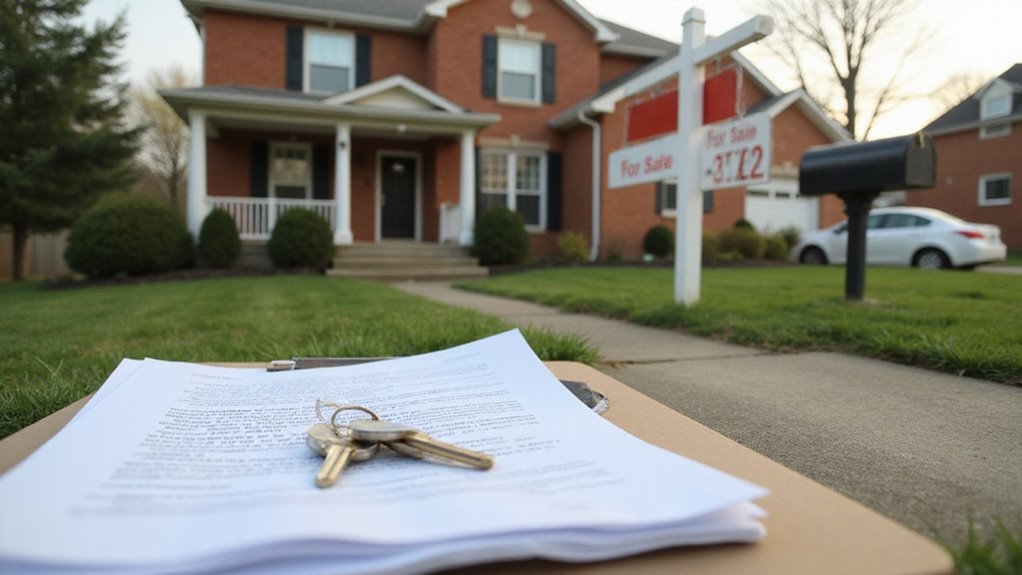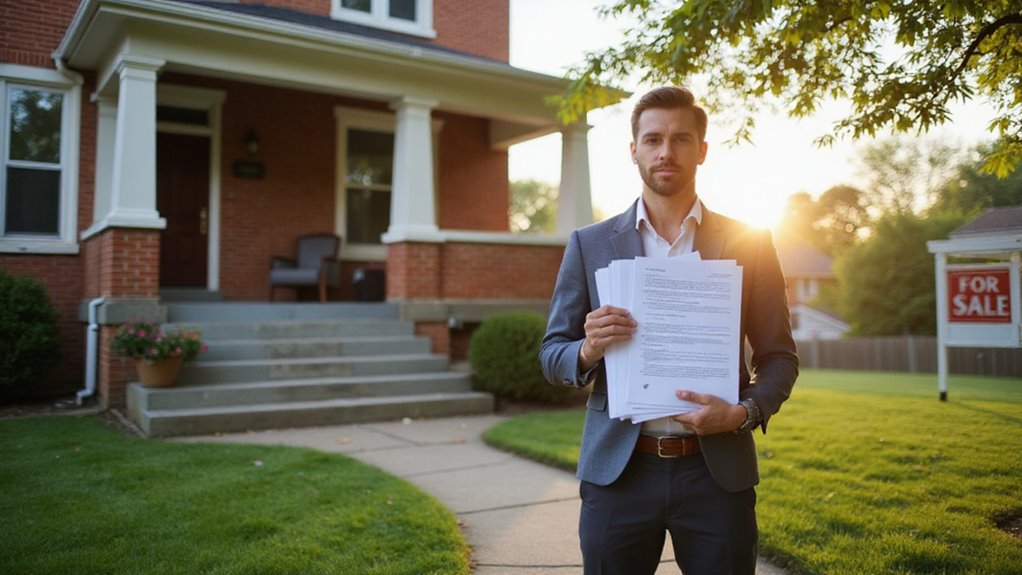Selling a House With Liens in Cincinnati




Selling a house in Cincinnati can be tricky if there are liens on the property. Liens are legal claims that can block or delay a sale. Many homeowners do not realize how much liens can affect their plans until it is too late.
If you ignore a lien, you risk losing buyers or facing legal trouble. Even a small unpaid debt can create big problems at closing. Liens can lower your profit and make the process stressful.
The best way to sell a house with liens in Cincinnati is to address the liens early and work with experienced professionals. You can clear the title, negotiate payoffs, or use creative selling options.
Knowing your choices helps you protect your sale and peace of mind. This blog will guide you step-by-step to handle liens and sell your house smoothly in Cincinnati.
Table of Contents
Understanding Property Liens

A property lien is a legal claim on your house due to unpaid debts. Liens can make selling your Cincinnati home more difficult. Buyers may not want a house with liens because it can affect financing. If you have a lien, you may get less money from the sale. Some buyers may walk away if the title is not clear. Lenders often require all liens to be settled before closing.
Homeowners should check for liens before listing a property. A title search can help find any hidden claims. Addressing liens early can prevent delays and protect your credit. If you ignore a lien, you may face legal trouble or a failed sale. Clearing liens helps you keep control of the selling process. If you resolve all liens, you can often sell faster and at a better price.
Types of Liens Affecting Home Sales
When you’re preparing to sell your house in Cincinnati, you’ll need to address several types of liens that can impede the transaction, including tax liens, judgment liens, mechanic’s liens, and HOA liens. Each lien type carries unique legal ramifications and impacts your ability to transfer clear title. Understanding how these encumbrances function is essential to charting a successful sale. Tax liens create specific problems when selling a home in Cincinnati. If you owe property taxes, the county can place a lien on your house. This lien must be cleared before you can transfer ownership.
A tax lien takes priority over most other debts, including your mortgage. The county can auction your home if you do not pay the debt. Title companies will not insure a home with an unpaid tax lien. Investors and buyers usually want a clear title before closing a deal. If a tax lien exists, they may offer less money for your property. You must pay the lien to complete the sale.
Judgment Liens
Mechanic's Liens
HOA Liens
Judgment liens are legal claims on your property due to unpaid debts. If you try to sell your house in Cincinnati, they can stop the sale. You cannot transfer ownership until the lien is paid or removed.
Title companies and buyers will see the lien as a problem. Judgment liens also gain interest, so the amount you owe can grow over time. This makes selling your house more difficult.
You can pay off the debt, dispute the lien, or make a deal with the creditor. If you handle the lien early, you will have more control over your sale. Early action helps you avoid delays at closing.
A mechanic’s lien is a legal claim on your property for unpaid work or materials. Contractors, suppliers, or subcontractors can file this lien if you do not pay them. This lien can stop you from selling your home until you resolve it.
Homeowners have rights when dealing with mechanic’s liens. You should know about proper notice and the time limits for filing these liens. If you ignore these rules, you may face legal trouble.
If you receive a mechanic’s lien, first check if it is valid. You can try to settle or pay off the lien with the person who filed it. After payment, always request a lien release document.
Invalid liens can be challenged in court. Legal advice is helpful if you believe the lien is not valid. Quick action can prevent bigger problems during a home sale.
An HOA lien is a legal claim placed on your property if you do not pay HOA fees. The homeowners association uses this lien to collect unpaid dues or assessments. If the debt is not paid, the HOA can start foreclosure.
Homeowners must pay all HOA fees on time and follow the association rules. If you miss payments, the debt can grow with added interest and legal costs. These extra charges make it more expensive to clear the lien.
When selling a house with an HOA lien in Cincinnati, you must pay off all dues before closing. Title companies will find any unpaid HOA liens during the sale process. If liens are not resolved, the sale could be delayed or cancelled.
If you pay all outstanding amounts, you can transfer ownership without issues. Resolving HOA liens helps protect your property rights. It also ensures the sale goes smoothly.
How to Sell a House with Liens

When you’re ready to sell a house with liens, you’ll need to initiate a comprehensive lien search to identify all outstanding encumbrances. You must negotiate payoff terms, coordinate title clearance, and evaluate various settlement options to ensure a marketable title. Each step requires precise documentation and legal compliance to enable a seamless transaction.
Lien Search Process
You must complete a lien search before selling a house with liens in Cincinnati. This search finds all debts or claims tied to the property. If you skip this step, you could face problems with buyers and closing. A title company or real estate lawyer can help with this process. They will check public records for things like unpaid taxes or court judgments. Any missed liens could lower the value of your home.
Start by getting a preliminary title report from a reliable title company. County records should be checked for tax liens or judgments. Make sure to look for any unresolved contractor or HOA liens. Always confirm your results with proper paperwork. This ensures buyers trust the sale and avoids last-minute issues. If you follow these steps, your sale will go more smoothly.
Payoff Negotiations
Payoff negotiations are important for closing a home sale in Cincinnati if there are liens on the property. Sellers must work directly with lienholders to agree on a payoff amount. Closing cannot happen until all liens are resolved.
Sellers should provide recent property value reports to support their case. A comparative market analysis can show the fair market value and help lower the payoff. If the home does not have much equity, lienholders may accept less than the full balance. Written payoff statements are necessary to confirm the amount owed. Sellers should check all charges for accuracy, including interest and fees. If a cash buyer, such as Prestige Investments Cincinnati, is involved, they can help with negotiations and speed up the sale.
Title Clearance
Title clearance means making sure your house has no legal issues before selling. Without a clear title, you cannot transfer ownership. This is necessary even if your home is valued well or looks appealing.
A preliminary title report will show any liens or claims on the property. You should hire a trusted title company with experience in these situations. If liens exist, you must contact the lienholders to get payoff details. Gather documents that show your home’s value and condition. These may help during talks with buyers or lienholders. If you complete these steps, you can sell your house legally and smoothly.
Settlement Options
You must resolve any liens found during the title clearance process before closing the sale. Usually, you can pay off the liens or request a lien release if the debt is already settled. If your home has enough equity, the liens can be paid using the sale proceeds at closing.
Cash buyers, such as Prestige Investments Cincinnati, may provide faster settlement options. They often handle the legal work and can close quickly if you need to sell fast. This can be helpful if you want to avoid delays. If you address liens early, you may have more power when negotiating with buyers. Home staging and promoting local amenities can attract better offers. Choosing the right settlement method helps make the closing process smoother.
Legal Requirements for Lien Resolution
You’ll need to gather all relevant lien documentation, follow precise release procedures, and comply with any court-imposed requirements when resolving liens in Cincinnati. It’s crucial to address payment priority, as multiple liens may dictate a strict order for settlement. Ensuring each step aligns with Ohio’s legal standards protects your transaction from future disputes and delays.
Proper paperwork is needed to resolve liens when selling a house in Cincinnati. Documentation helps make sure the title is clear for the buyer. It also protects both the buyer and the seller during the sale. You should collect certain documents before listing your home. These include lien payoff statements that show how much is owed to each lienholder. If any paperwork is missing, the sale process may be delayed.
A current title report shows all claims or debts on the property. Release of lien forms are needed to remove each lien once paid. Previous settlement statements, like HUD-1 forms, can help answer questions from buyers. If you gather all these documents early, the sale will go more smoothly. Proper documentation also makes your home more attractive to buyers. This preparation helps avoid surprises at closing.
Release Procedures
Court Requirements
Payment Priority
You must clear all liens before closing on a property. This process requires getting a lien release from each creditor. If you do not complete these steps, the sale may not go through.
To secure a release, pay the full lien amount or agree on a settlement. Home inspection and property value may affect your strategy. If the valuation is low, there may be less equity to cover the liens.
Work with your title company and legal advisor to record all releases. All documents must be filed with the Hamilton County Recorder’s Office. Track each lien’s progress to avoid delays.
Courts can get involved when you sell a house with liens in Cincinnati. If liens are not resolved before selling, the court may step in. This ensures that all debts are paid and the sale is legal.
If you cannot settle the liens yourself, you may need to file a complaint in court. The court process could include foreclosure or a quiet title action. These actions help clear up who owns what and how much is owed.
Everyone with a legal interest must be notified. This includes lienholders, heirs, and any creditors. Notification gives them a chance to respond or make a claim.
The court will then review and decide on the liens. It checks if the liens are valid and how much needs to be paid. Sometimes, the court will order a sale of the property.
A court-supervised sale might be required for special cases. This is common for historic homes or if ownership is complicated. The court makes sure the process is fair for everyone involved.
Payment priority means the order in which debts are paid during a home sale. This order is important for a clear title transfer. If the court gets involved or liens appear, you must follow this order.
Tax liens are paid first, before any others. Next, the mortgage lender gets paid. Mechanic’s liens come after the mortgage, followed by any judgment liens.
If there is not enough money to pay all debts, the lower-priority liens might not get paid. Any unpaid debt may still be your responsibility. Understanding this order helps you close the sale smoothly.
Submit Your Information Below For A Cash Offer On Your Property
Options for Dealing with Liens

You’ll need to assess several strategies for resolving liens before closing your sale, including paying from proceeds, negotiating settlements, or initiating dispute resolution if you contest the debt. Each approach involves distinct financial and legal implications, so understanding the lien release process is critical for a smooth transaction. By addressing these options strategically, you can prevent delays and ensure a clear title transfer.
Paying from Proceeds
Paying from proceeds means using money from the home sale to pay off any liens. This is a common way to handle liens during a house sale in Cincinnati. If you choose this method, you will not need to bring extra cash to closing.
The title company will check for any liens on your property. They will ask each lienholder how much is owed. At closing, the title company pays the lienholders from the sale proceeds. You receive any leftover money after all liens and costs are paid. This method helps ensure you meet legal requirements. The process also clears the title for the new owner.
Negotiating Settlements
If the sale will not cover all your liens, you can try to negotiate settlements with lienholders. Settlement means asking them to accept less than the full amount owed. This can help you clear the title for the buyer. You should check which liens have the highest priority. Primary mortgage holders usually get paid first. Secondary or junior lienholders get paid only if money remains.
If you negotiate, show each lienholder the breakdown of sale proceeds. Explain clearly how much is missing to pay everyone in full. Lienholders with lower priority may accept less if they know they might get nothing otherwise. Always put any agreement in writing. Make sure each lienholder agrees to release their claim after payment. This step is necessary to transfer a clear title to your buyer.
Dispute Resolution
Dispute resolution is needed if you disagree with a lien’s amount or validity. These disagreements can come from mistakes, high charges, or false claims. You should use the right steps to protect your property and equity.
Title companies can help both sides talk and check the paperwork. If you have proof a lien is wrong, you can take legal action. Some government liens let you ask for a hearing to review the case. If both sides agree, arbitration can settle things quickly and is final. Choosing the right method can help you sell your house without delays. Each option fits different situations, so pick the one that works best for you.
Lien Release Process
The lien release process ensures your property title is clear before you sell. You must get a lien release after resolving any disputes. This helps you transfer ownership without legal issues.
First, contact your creditor to get the exact payoff amount. Next, pay the amount and ask for a lien release form. If the creditor agrees, they will give you this legal document. Then, file the lien release with the Hamilton County Recorder’s Office. This step updates public records and proves your title is clear. Buyers are more likely to trust a property with no liens.
Follow these steps for a smooth sale:
| Step | Responsible Party | Documentation Needed |
|---|---|---|
| Secure payoff amount | Homeowner | Payoff statement |
| Obtain lien release | Creditor/Lienholder | Lien release form |
| File with county | Homeowner/Attorney | Recorded lien release |
If you complete these steps, you can avoid closing delays. Proper documentation ensures buyers have confidence in your property.
Markets We Buy Houses In
Need Help with Lien Resolution? Prestige Investments Cincinnati Has Solutions
If you need help with lien resolution, Prestige Investments Cincinnati can assist you. The company has experience handling property liens in Cincinnati. You can get help with the process from start to finish.
Prestige Investments Cincinnati can buy properties with liens. They will handle all legal paperwork and negotiate with lien holders. You do not need to fix up your property or worry about safety concerns.
If you want a quick sale, Prestige Investments Cincinnati can close fast. The team will offer fair and clear prices. All steps are managed for a smooth transfer.
You can trust Prestige Investments Cincinnati to resolve property liens without hassle. If you have questions about your situation, their team is ready to help. Consider reaching out for a stress-free experience.
Selling a House With Liens in Cincinnati: Frequently Asked Questions
Can I sell a house with a lien on it in Cincinnati?
Yes, you can sell a house with a lien, but the lien must be paid off at or before closing. Most buyers won’t proceed until the lien is cleared.
What types of liens can affect a home sale?
Common liens include tax liens, mortgage liens, mechanic’s liens, and judgment liens. Any of these must usually be resolved before selling.
How do I find out if my house has any liens?
You can check with the Hamilton County Recorder’s Office or order a title search through a title company to find existing liens on your property.
Will a title company discover all liens during a sale?
Yes, title companies perform a thorough search and will find most recorded liens during the closing process.
Can I sell my house if I can’t afford to pay the lien?
It’s possible. You can try negotiating with the lienholder or sell to a cash buyer who may agree to handle the lien as part of the purchase.
Do I need a lawyer to sell a house with liens in Cincinnati?
Having a real estate attorney is a smart idea. They can help negotiate lien settlements and ensure a smooth closing.

